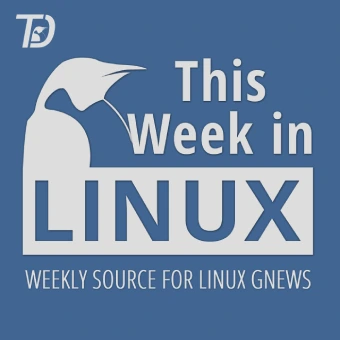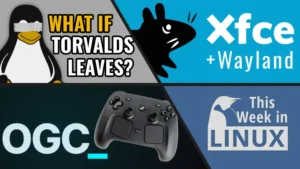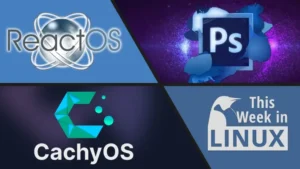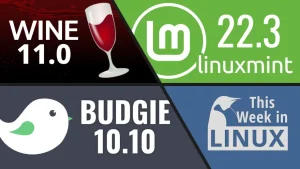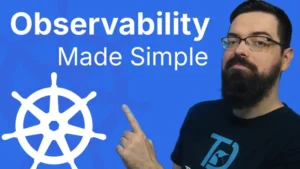This week in Linux, we’ve got a response from Valve on the recent Anti Cheat issues. Red Hat has announced the release of RHEL 9.5 & and the beta release of RHEL 10. We’ve also got some exciting news from Fedora as they will be promoting the KDE Spin to a full Edition with Fedora 42. Then we’ll talk aboue Mozilla and how they are continuing the drop the ball. All of this and more on This Week in Linux, the weekly news show that keeps you up to date with what’s going on in the Linux and Open Source world. Now let’s jump right into Your Source for Linux GNews!
Support the Show
Become a Patron = tuxdigital.com/membership
Store = tuxdigital.com/store
Chapters:
00:00 Intro
00:40 Valve’s response to the recent Anti Cheat Issues
03:04 Red Hat Enterprise Linux 9.5 & RHEL 10 Beta
04:52 Fedora KDE is being promoted for Fedora 42
06:05 Mozilla Foundation layoffs and drops Advocacy Division
12:05 CachyOS 241110
13:23 Hyprland 0.45 Compositor
14:43 VMware Workstation is Now Free for Commercial Use Too
18:18 Support the show
Links:
- Valve’s response to the recent Anti Cheat Issues
- https://store.steampowered.com/news/app/1675200/view/4472731215261073464
- https://automaton-media.com/en/interviews/the-steam-deck-has-seen-widespread-success-but-its-not-stopping-there-we-ask-valve-about-the-steam-decks-challenges-and-future-goals/
- https://steamcommunity.com/games/593110/announcements/detail/4480613067569233924
- Red Hat Enterprise Linux 9.5 & RHEL 10 Beta
- https://www.redhat.com/en/about/press-releases/red-hat-expands-linux-automation-latest-version-red-hat-enterprise-linux
- https://docs.redhat.com/en/documentation/red_hat_enterprise_linux/9/html/9.5_release_notes/index
- https://docs.redhat.com/en/documentation/red_hat_enterprise_linux/10-beta/html/10.0_beta_release_notes/index
- https://docs.redhat.com/en/documentation/red_hat_enterprise_linux/10-beta/html/10.0_beta_release_notes/index
- Fedora KDE is being promoted for Fedora 42
- Mozilla Foundation layoffs and drops Advocacy Division
- CachyOS 241110
- Hyprland 0.45 Compositor
- VMware Workstation is Now Free for Commercial Use Too
- Support the show
Transcript
View full transcript
Michael:
[0:00] This week in Linux, we’ve got a response from Valve on the recent anti-cheat issues. Red Hat has announced the release of RHEL 9.5 and the beta release of RHEL 10. We’ve also got some exciting news from Fedora as they will be promoting the KDE spin to a full edition with Fedora 42. Then we’ll talk about Mozilla and how they are continuing to drop the ball. All of this and more on This Week in Linux, the weekly news show that keeps you up to date with what’s going on in the Linux and Open Source world. Now let’s jump right into Your Source for Linux GNews.
Michael:
[0:40] This week from Valve, we’ve got a lot of stuff because they have announced a new edition of the Steam Deck. If you’ve held back from buying the Steam Deck because you didn’t want a dark gray / black version of the console, well, Valve’s got you covered because they are now offering a white edition of the Steam Deck, which comes with light gray buttons on the controllers. And they also say that if this proves to be viable, then they might make some Steam Decks in other colors. They haven’t announced that they would, but they say if this testing of the new version does seem to be what people want, then they will open up maybe potentially more colors. So that’ll be interesting to see. You could also just get a skin to apply to the one you already have, but you know. Recently, the website Automaten Media published an interview they had with Valve designer Lawrence Yang and Valve programmer Pierre-Loup Griffais. I think I said that right.
Michael:
[1:33] I probably didn’t. I’ll have a link to the article in full in the show notes, but there’s one piece that I wanted to bring to the show. They asked if there is anything done for anti-cheats, such as getting in the way for the games on the Steam Deck, and if so, what progress has been made. Lauren says that we have done work and partnered with Easy Anti-Cheat and BattleEye to make it easier for developers to enable support for Steam Deck, such as Elden Ring, for instance, uses Easy Anti-Cheat and it’s one of the most popular games on the Steam Deck. Pierre Luz says, We have been monitoring the trend of games requiring kernel-level access to their anti-cheat technologies and not supporting Steam Deck as a result. We are extremely aware of the critical need for countermeasures against cheating in online games, but are also considering options carefully. Some of the approaches popular now in the industry might present problematic trade-offs for the end-user in the longer term. So ultimately, what does that mean? Well, it means that they’re aware of it and that they are trying to do something. We don’t know what they’re trying to do or what they even plan to do or anything, but.
Michael:
[2:37] They are trying, they are working on getting this a solved issue, but this could get even worse. We’ll have to wait and see on that. Also this week, Valve made some nice improvements to the Steam client, including fixing an issue causing native Linux titles to occasionally run on the wrong runtime. They made some enhancements also to the Steam game recording feature and have made some improvements to Steam VR.
Michael:
[3:01] You can find links to all of this in the show notes. Red Hat announced the release of RHEL 9.5 and RHEL 10 beta this week. Red Hat Enterprise Linux 9.5 includes several new system roles, including a new role for sudo to automate the configuration of sudo at scale. This enables everyday users to run commands typically reserved for admins with the proper guardrails to manage roles.
Michael:
[3:26] RHEL 9.5 also features Red Hat Satellite 6.16 with support for installing the satellite server and the capsules on RHEL 9 systems plus Red Hat Enterprise Linux 9.5 has new file management capabilities in web console for performing routine file management tasks without using the command line, RHEL 9.5 also ships with Podman 5.0, an open-source container engine for building, managing, and running containers in Linux systems. Podman 5.0 is a major release that introduces Podman Farm Build, so developers can quickly build multi-platform images on remote machines in a single command.
Michael:
[4:08] Red Hat also has released the first beta version of Red Hat Enterprise Linux 10 for testing, So the next version of RHEL is going to have a lot of new features. We’ll talk about them in much more depth when the final release happens. But for now, here are the highlights. They switched the graphic system for the install image from X to Wayland. They have replaced VNC for graphical remote access with RDP or the remote desktop protocol. And with the RHEL 10 installer, newly created users will have administrative privileges by default unless unchecking the option. If you’d like to learn more about the latest releases from Red Hat with RHEL
Michael:
[4:46] 9.5 or the upcoming RHEL 10 beta, you can check out the links in the show notes. Fedora Linux have announced that with the next release of Fedora 42, the KDE spin will be promoted to a full edition right alongside the GNOME workstation version. A few months ago on TWIL 258, we talked about a proposal that was made to switch the workstation from GNOME to KDE, but it seems like they found a compromise instead.
Michael:
[5:13] Now this is great news for Fedora KDE fans out there because it means that this spin will now get some additional attention and benefits as being an addition. One of the things it will get is having the Fedora KDE Plasma Desktop Edition listed at the same level as Fedora Workstation Edition on fedoraproject.org and production of a flagship site page for Fedora KDE similar to Fedora Workstation on FedoraProject.org. And it will also receive marketing support in a similar vein to how Workstation gets at some events.
Michael:
[5:46] For those who don’t know, I’m a KDE fan, and I have used Fedora as a daily driver for years now, so I have a soft spot for the Fedora KDE Spin, and I love that the team behind the project is getting this kind of love because
Michael:
[5:58] it will bring new users to the KDE Spin and also help Fedora expand with adoption, in my opinion. Mozilla is back in the news this week, but not because there’s some cool new release of Firefox or because they’ve introduced a new service that people actually want. Unfortunately, it’s because they have, there’s been reports that the Mozilla Foundation is cutting 30% of their staff and closing their advocacy division. Mozilla’s Foundation’s Communications Chief Brandon Borrman confirmed to TechCrunch saying, the Mozilla Foundation is reorganizing teams to increase agility and impact as we accelerate our work to ensure a more open and equitable technical future for us all. That unfortunately means ending some of the work we have historically pursued in eliminating associated roles to bring more focus going forward. That is saying a lot without saying hardly anything, you know? So they’re reorganizing teams to increase agility and impact. Okay, how? How does this increase agility and impact?
Michael:
[7:02] You’re getting rid of things that somehow is giving you more focus. Having less people to work on stuff doesn’t give you more focus it actually spreads work out to fewer people so, at least that’s how i interpret that and if it was just like hey we’re getting rid of this division that’s one thing but it’s getting rid of this division and letting go people in that division like uh okay that doesn’t sound great now we don’t know exactly how many people are included in that 30%. But estimates are saying around 36 or so, because some reports are claiming that the total amount at one point was 120 people. Others are saying that it’s 300 people at some point, but we don’t really know for sure. So estimates are around like 36. So it’s still, it’s not a great thing. I mean, I too was laid off this year, and it’s not fun. So I feel for the people affected by this. And well, it just looks, it looks kind of bad for Mozilla at this point. And I know they’ve been having funding issues because they have been losing market share for a long time.
Michael:
[8:13] Like a long, long time. Firefox is my favorite browser. I’ve been using it for I don’t even remember how long before it was called Firefox, I can tell you that Phoenix or something. And I don’t remember, there’s a bunch of them. It’s been years, many, many years. So I have been a Firefox user. And I’ve been a fan of the project and also the team behind it for a long time. And it’s just a shame to see this kind of thing happening, especially when the reasons they give are very corporate speak. Laying off people for the reasons they’re saying is basically, in my opinion, the laziest and coldest way to address funding issues. There’s other ways to do it. There are services you could have. You could do more things that bring more revenue in and that sort of thing. And it’s just a shame to see this kind of thing and really Mozilla is doing some weird stuff lately there are people you know that the advertising stuff they’ve been doing we talked about that on Destination Linux if you want more details on that check out that episode i’ll have it linked in the show notes but this is not giving a lot of confidence that they are pivoting well.
Michael:
[9:21] And uh hopefully like i would this is a report they have not announced it themselves but they have confirmed that it’s happened to TechCrunch and they’ve also replied to Engadget with some more information for clarity. Apparently it’s supposed to be clarity. Borman goes on to say in a reply to Engadget, we want to clarify that the restructuring has not dropped advocacy. On the contrary, advocacy is still a central tenet of Mozilla Foundation’s work and we are in the process of revisiting our approach to it. When you end the entire division.
Michael:
[9:59] It does seem like you’re dropping the process of that division so if it’s the central tenet of the foundation’s work why would it drop the defense division in the first place it just doesn’t it doesn’t make sense and this just feels so corporate-y and i don’t know like i want Mozilla to be successful i want um i want firefox to be a bigger player in the space because the mission that Firefox has is great. And I love the idea of open web and all that. So please just, you know, I don’t know what you could do necessarily to fix this. But a couple ideas I have are create services that people actually want, create a suite of services that people can get and say, you know.
Michael:
[10:49] An email service, a calendar service, basically just copy Google Drive, just copy their the G suite and give people something like that. The Mozilla suite, just do that. It seems like a simple thing. I don’t know. Uh, but they’ve been doing various services that don’t work out and they’ve abandoned most of them. They also have the Mozilla VPN service, which was in theory is a good idea. Like I would, I would like to use Mozilla VPN because it sounds like one I could trust, but the price of it is too much it’s you take you’re taking mulvad service and then slapping Mozilla on it and doing whatever else you’re doing i don’t know but it seems like not much and then charging double the cost that mulvad is like why would anybody do that it just doesn’t make sense like do a suite charge the same amount and give more than one thing that you’re just remarketing, it’s I don’t know what to say I hope Mozilla comes out of this better but.
Michael:
[11:56] They’re on a weird path. Like, it seems so obvious. Like, just give services that people actually want. How hard is that?
Michael:
[12:04] CachyOS has a new release announced this week, and for those unfamiliar, I’m not sure if it actually is pronounced CachyOS. Might be CatchyOS. I couldn’t find the answer to that. But CachyOS is a Linux distribution that is based on Arch Linux, and they say they focused on speed and security optimizations. The project’s latest snapshot is CachyOS 241110, which introduces several kernel and firmware updates, which should improve gaming performance. They have backported the THP shrinker from the 6.13 Linux kernel, and THP stands for transparent huge pages, and this will allow splitting huge pages earlier, reducing memory usage when transparent huge pages is set to always while maintaining the same performance. They also added the AMD Cache Optimizer, which can be modified at runtime to the preferred mode of cache or frequency. This changes the AMD preferred core ranking. This should help in games using like the wrong CCD, for example. You can find instructions on their wiki for how to use it. I’ve not had a chance myself to try catchy OS, but let me know in the comments if you’ve tried it out. What do you think of it?
Michael:
[13:17] I do want to give it a shot, but time is so precious these days.
Michael:
[13:21] Again, you know, let me know what you think. Hyprland 0.45 was released this week. For those unfamiliar, Hyprland is a Wayland compositor focused on being an independent, customizable, eye candy rich, and dynamic tiling compositor. So let’s talk about what’s new with Hyprland 0.45. They have improved the algorithm for using round edges. So rounded corners, borders, rectangles should all now be considerably more smooth. They’ve also improved default behavior for hardware cursors on NVIDIA. They will now be automatically disabling that by default as they are buggy, they say. They plan to try and fix them later in the next one for 0.46. Also, Hyprland will now warn you if you incorrectly installed assets instead of failing and rendering a black screen. That’s good. Windows snapping for floating windows has been added to this compositor. For those who want to have floating windows and dynamic tiling.
Michael:
[14:17] This is mostly a tiling window manager. But floating is something that I like to use as well on occasion. Actually, I pretty much like to use floating and tiling equally at the same time. So I have a different workflow that might not be for everybody. Now I’ve not had a chance to try Hyprland myself. But let me know in the comments what you think and if you’ve tried it out. And also, if you have tried it out, let me know what distro you used it on.
Michael:
[14:43] VMware has announced something pretty interesting this week as both VMware Workstation Pro and the Mac equivalent Fusion Pro are free to, well, everyone. So they can use it whatever they want to use it for. And that includes a personal usage and commercial usage. And with this change, VMware Workstation Pro and Fusion Pro are no longer available to purchase. This is very different from the last announcements they had where they were giving it for free, but you still had to pay for commercial use. But it makes you think.
Michael:
[15:15] Why are they doing this? They say, we’re thrilled to announce a significant change that reflects our commitment to making VMware Fusion and VMware Workstation more accessible than ever. These powerful desktop hypervisor products will be available for free to everyone, commercial, educational, and personal users alike. Now, that does sound pretty good, but it also makes you curious, like, why are they making it possible when they were making so many changes in the contrast before? Like if you go back a few months ago, VMware was purchased and they were doing all sorts of weird things that no one liked. And they got a lot, well, not maybe not no one, but a lot of people were not happy with VMware, what they were doing. So this is interesting that they’re trying to change this here for what reason? Because they’re also making it not possible to purchase support. so if you use workstation pro and fusion pro i feel like that’s what their actual task is for like this is why because they can eliminate the support side of it so people could still use it but then they wouldn’t have to do any support because if you look at the free support uh model they say that you have community access so you can get help from other users you also have the product documentation and the knowledge base but it doesn’t show any any options for actually paying for support.
Michael:
[16:41] And they do say that if you have support, you can continue to have it up until you don’t have it anymore. So it says our commitment to maintaining high standards of support remains unchanged throughout your contract duration. So as long as you have paid for it, then their commitment is they still have a really high standard of your support until you don’t have it, then they give you no support.
Michael:
[17:06] I feel like it has to be like they don’t want to put in the effort of support, because that the only way that makes sense to me. But that’s also just my interpretation, I could be completely wrong. They do say that they are continuing investment, that they’re actively investing in new features and usability improvements and other valuable enhancements. And they say that product stability and quality like there are their engineering teams are committed to maintaining high standards for stability with timely updates and reliable performance.
Michael:
[17:36] Okay. And they have a broader user base enables them to gather valuable insights, helping them to optimize offerings and deliver even greater value. And that’s the reason why they would want to have more people use the free version. They could still provide support, even if they had a free version, like there are many companies that have free software, freeware, and then you pay for support. And it doesn’t look like you can do that. So that’s weird. But hey, if you were wanting to use VMware.
Michael:
[18:10] You can now seems so I guess check it out the links in the show notes,
Michael:
[18:15] or the other alternatives that exist. Thanks for watching this episode of this week in Linux. If you’d like to do here on this show and want to be kept up to date with what’s going on in the Linux and open source world, then be sure to subscribe. And of course, remember to like that smash button. if you’d like to support the show and the tux digital network then consider becoming a patron by going to tuxdigital.com/membership where you get a bunch of cool perks like access to the patron only sections of our discord server joining us live in the patron only skybox as well as in the patron only post show that happens every week after the show and many many more including you get some cool perks for the Destination Linux podcast similar to those and even more so go to tuxdigital.com/membership to get started. You can also support the show by ordering the Linux is Everywhere t-shirt or the This Week in Linux shirt, which I’m wearing right now at tuxdigital.com/store. Plus, while you’re there, check out all the other great stuff we have like hats, mugs, hoodies, and more at tuxdigital.com/store. I’ll see you next time for another episode of Your Source for Linux GNews. Thanks again for watching. I’m Michael Tunnell. I hope you’re doing swell. Be sure to ring that notification bell. And until next time, I bid you farewell.
